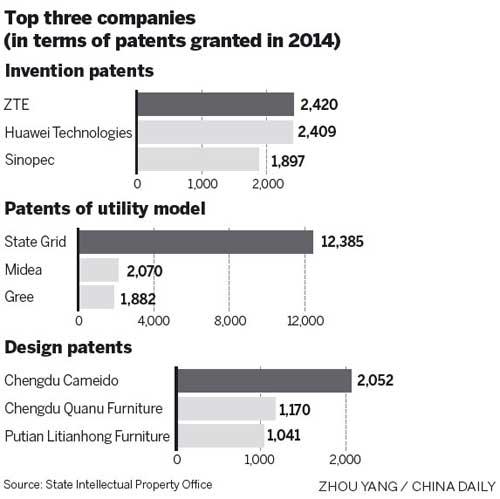People's Daily Online and the Intellectual Property Publishing House jointly unveiled three lists on Jan 20, ranking the top 10 companies, universities and research institutes in terms of granted patents in 2014.
The lists were based on statistics from the State Intellectual Property Office.
Li Cheng, deputy head of the publishing house, said that four Chinese auto companies made the top 10 companies list for patents of utility model, which "shows a further awakening of patent awareness in the industry in China".
He said most companies on the top 10 list for design patents were in the shoes, furniture, household electrical appliances and sanitary ware industries, which consider product design core to their competitiveness and thus protect their creations by using patents as weapons.
The deputy head also said Chinese universities have achieved a rapid growth in both patent applications and authorizations in recent years, but still have a low rate of patent commercialization.
How to "really strengthen the collaborative innovation between colleges and companies" and improve "Chinese universities' capacity for creativity and technical development" is worth thinking about, he added.
Two forums were held the same day, at which experts discussed patent litigation and operation in China.
Since China joined the World Trade Organization in 2001, it has seen rapid growth in its number of patent lawsuits. Some have involved compensation of more than 100 million yuan ($16 million).
Feng Shujie, an associate professor at the law school of Tsinghua University, said the number of patent litigations is related to market competition. The more intense market competition becomes, the more likely it is that companies will initiate patent lawsuits.
"The increase shows that our market economy has developed to a certain level where product competition relies on technological competition, and also that China now has a considerable number of local companies who have more high-quality patents and are ready for such litigation," People's Daily Online quoted Feng as saying.
He also said companies would prefer to solve problems or disputes through negotiation in the future when all involved have strong competitiveness and core technologies. But for now, the number of patent cases is expected to continue to rise for a long time.
Ha Si, a lawyer in Beijing who has covered the IPR sector for more than 20 years, said China set up three dedicated IP courts last year, a signal that more stringent judicial protection will be implemented, and the costs for patent infringement would also greatly increase.
In 2015, companies in industries such as cell phones and mobile communications would probably "encounter more patent cases", she said.
Patent litigation has become a worldwide phenomenon and the accumulation of patent portfolios is "very necessary" to deal with it, she said. Companies should have both "offensive and defensive patent layouts", she added.
Lyu Rongbo, a senior manager at the publishing house, said last year was very important in terms of patents, as patent operation companies began to emerge in large cities including Beijing and Shanghai, and SIPO proposed the establishment of a national patent operation service center.
"Companies need to invest both financial and human resources to develop the value of patents," Lyu said. "For most, their IP departments are very costly. How to change it into a profitable sector is a question that many innovative companies are thinking about."
Sun Bin, an IP lawyer and patent manager at BOE Technology Group, echoed Lyu's opinion, saying patent operation, in a narrow sense, refers to how to change patents into money.
However, "it will be very difficult and involve a long process", she added. Even for the world's top companies, few earn profit from the patent sector.
Patent operation also includes purchases and sales of patents, which needs channels and people, Sun said.
"We now have diverse channels, along with the development of information technologies. What is in great demand are interdisciplinary talented people, including patent agents and lawyers," she said.


